Colin Powell, 1937–2021
Miller Center oral history interviews featured the first African American U.S. secretary of state
Then along comes…the February 5th [2003] famous speech [to the United Nations], which is going to be in my obituary, item number one.
Colin Powell's accurate prediction that he would be remembered for the incorrect assertion that Iraq had weapons of mass destruction [from a Miller Center oral history interview in 2017]
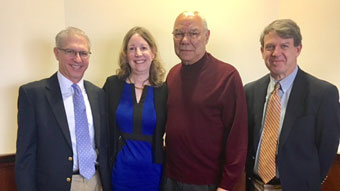
A professional soldier for 35 years and a high-ranking official in several administrations, Colin Powell, who died today of complications from COVID-19, was the go-to authority during dozens of international crises. The Miller Center's oral history team sat down with Powell twice in the past decade, as well as high-ranking officials—Dick Cheney, Robert Gates, Madeleine Albright, and others—who weighed in on his job performance and character. Here, some excerpts:
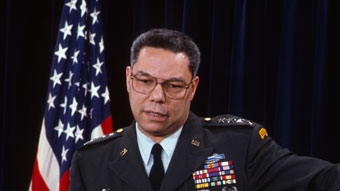
In 2011 and again in 2017, Powell talked about his time with Bush 41 and 43, his role as national security advisor and secretary of state, relations with the Soviet Union, events in Panama, colleagues in both Bush administrations, the Gulf and Iraq wars, and much more. Below are some excerpts. Read the oral history here for the George H. W. Bush administration and here for the George W. Bush administration.
I reported for duty the first working day [for deputy national security advisor] in 1987. The office is a tiny little cubicle compared to my Corps Commander’s suite, and I’m in my new place of business trying to figure out how I can fit into this tiny little room when suddenly I heard this boisterous voice coming down the hall: “Is he in there? Is he in there?” It was Vice President Bush, and he came in and gave me a warm welcome. “Great to have you here. Glad that you were able to accept the job.” That was the beginning of our relationship. For most of the next year, I was still the deputy national security advisor, and then I became the national security advisor in November of ’87, but we became very close during this period. One, we shared the same bathroom, which will dictate a certain degree of familiarity.
Read Powell's full oral history as national security advisor (George H. W. Bush)
Read Powell's full oral history as secretary of state (George W. Bush)
MORE ON COLIN POWELL
DICK CHENEY, secretary of defense (George H. W. Bush)
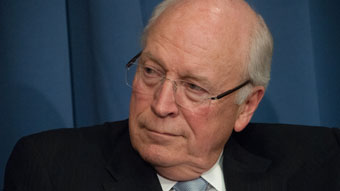
"There are two [people] right at the top of the list who were clearly more important than virtually anything else. First was Colin Powell. I made the decision the afternoon the president announced my appointment that if I could, I wanted to try to get Colin for my chairman of the Joint Chiefs of Staff. The background of that was, again, I mentioned Frank Carlucci earlier. Frank of course had been my immediate predecessor as Secretary, but Frank and I had worked together 20 years before at OEO as part of the Rumsfeld operation and been friends ever since. I’d heard Frank over the years talk about Colin Powell. Colin had been the White House fellow in OMB when Carlucci was there in the Nixon Administration working under Weinberger. Later on he’d been the military assistant to Cap Weinberger when Cap was Secretary.
"I’d met him when he was the corps commander in Germany. I’d been on an Intelligence Committee trip to the Middle East and on the way back stopped in Germany and spent part of an afternoon with the then-commander, I think, of Fifth Corps, and it was Colin Powell. Then when Iran-Contra blew up in ’87, Carlucci was brought back as the National Security Advisor. The first thing he did was to reach out and grab Colin and bring him in and make him his deputy. So I’d had the opportunity the last two years of the Reagan administration to work fairly closely with him on a lot of policy issues. As I say, at the time I was a senior Republican in the Congress on the House side, and during Iran-Contra, Colin and Frank were down cleaning up the NSC apparatus during the same period. I’d watched him work, we’d dealt on Contras and Central America together, other kinds of policy issues. I’d been impressed with the quality of his effort. The day he left the White House to go back to the Pentagon by the end of the Administration, I’d actually called him right there towards the end and expressed the hope that we’d have the opportunity down the road some point. I had no idea I was going to Defense or anything else, just wished him well.
"So when the president named me secretary, that evening, the first thing I did was to call Frank and go see Carlucci. We spent two or three hours together at his house in McLean, just talking about the department and so forth. But right at the top of my list was what did he think about the idea of General Powell as Chairman of the Joint Chiefs.
...
"There were some reservations about taking Colin at that point. He had just gone back to the Pentagon. He had just gotten his fourth star and been assigned to forces command. He didn’t even arrive down at forces command until about the time I signed on as secretary. The appointment had already been made, but he was just moving in. He was the youngest CINC and the most junior of the CINCs at that point, of the guys you’d look at as the pool of candidates, ordinarily, to be chairman.
"There was the Al Haig precedent. There was some concern about a 'political' general. You know, are you getting into a situation where a guy’s track is more political than it is military? Obviously, chairman of the Joint Chiefs requires certain political skills, but it is essentially the senior military man in the government. I think there was a little hesitancy. Brent had always had strong feelings that the NSC advisor should not be an active-duty military guy. When he took the job back in the Ford administration, he’d resigned his commission. He was an Air Force three-star and he had to give that up to become NSC advisor. Colin hadn’t done that; he’d kept his active-duty status. I think that was the price he extracted for agreeing to come back and give up corps command and come back and do the NSC job as the deputy.
"So there was a little bit of—not opposition, I wouldn’t put it in those terms—just questions, concern. Al Haig had come to the White House to work for Kissinger as a lieutenant colonel in the Nixon years. Returned to the Army as a four-star vice chief of staff. That didn’t always sit all that well with the troops. So there was a little bit of concern here too that we not get into a situation where Colin has left the Army, gone to the White House, and comes back as chairman of the Joint Chiefs.
"So I discussed it with the president and Brent. We left it that I would go reassure myself that Colin had in fact re-acclimated to the military and that there wouldn’t be a problem in this arena. So I went down at one point and visited him, had lunch with him in Atlanta, Fort McPherson, where he had forces command. What I was looking for was a feel for his comfort level. I didn’t ask him about the job. I didn’t tell him I was thinking about him for the job. Just that I was in the area, wanted to stop in, spend some time. It was clear that this was a guy who loved the U.S. Army, who had no qualms at all about moving back in the U.S. Army. It was my judgment based on that conversation that in fact this would fly and that we wouldn’t get into difficulties in terms of having a lot of resistance to it. So I went back and recommended to the president. The president signed off on it, Brent signed off on it, and we nominated him to be chairman.
It’s not possible to conceive of my tour without Colin Powell as an integral part of it.
"We could spend hours talking about it. He came on board on October 1, 1989. I thought it was a stroke of genius to recommend him for the job, one of my best decisions. When I think back now on my time there, it’s not possible to conceive of my tour without Colin Powell as an integral part of it. He was good, not only was he good from a military perspective, but he had all of the understanding that went with having been the military assistant to the secretary and the NSC advisor and so forth. That worked very well. We didn’t always agree. There were times when we had differences, and there will be opportunities to talk about individual issues there, but that was a key decision and a good one, I think."
Read Cheney's full oral history.
ROBERT GATES, deputy national security advisor (George H. W. Bush)
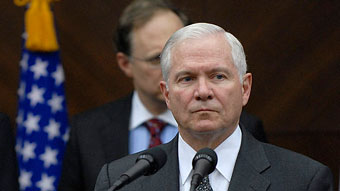
Q: There are a couple of things with the Gulf War that we should touch on before we leave the topic. One is the decision to end fighting, and this has to do with how the doors were supposed to be slammed shut on Republican Guard. Do you remember much about what was known before the meeting, in terms of the situation on the ground?
Gates: "Well, the whole thing started, in terms of the final phase of the war, with the 'Highway of Death' sequences. And it really bothered Powell. I think it bothered Colin a lot more than it bothered some of the rest of us. And Colin, basically at one of our meetings, and I can’t remember the day, essentially said, 'This is turning from a military conflict into a rout and from a rout into a massacre and the American army does not do massacres.' He said, 'I think that we will have completed our objectives and be prepared to stop within 24 hours.' Then the next day he came in and we started talking about a cessation of fighting.
Q: When you say “we” it is—
Gates: It is the gang of eight. Started talking about a cessation of fighting and as I recall, the President asked Colin, “How much more time do you need?” Colin said, “Let me call Schwarzkopf.” And the picture that you’ve seen of Colin talking on the phone from the drawer of the desk in the Oval Office, that’s the secure phone in the Oval Office and that’s him talking to Schwarzkopf. And Schwarzkopf said that he thought that he needed just three or four more hours. I remember Sununu piping up and saying, “Well, if we extend it a couple of hours beyond that it will be an even hundred hours which has a nice ring to it.” So in fact, the military was given more time than they asked for to close the door. I think what happened was there was a fog of war problem, and that Schwarzkopf did not know exactly the status of the battle that was going on north of him and how much time would be required to actually close the door.
Q: Why was he in such a rush? Why wouldn’t he wait for the fog of war to clear before making this kind of call?
Gates: "I don’t honestly know the answer to the question. And the degree to which Colin was pressing to end it. All I know is that the initiative in terms of when to end the war, the fighting, came from the military, not from Bush or any of the civilians, and whether Schwarzkopf had checked with his commanders and they underestimated what they needed, or whether he didn’t check and just made his own off-the-cuff estimate, which is not unlike him, I don’t know. But the initiative, in terms of— From the civilian standpoint the military was given more time than they asked for, regardless of how feckless the reason."
Read Gates' full oral history.
MADELEINE ALBRIGHT, secretary of state (Bill Clinton)
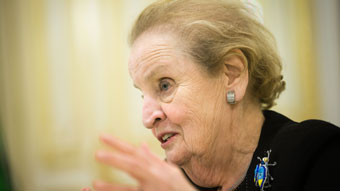
"You have a huge agenda at the beginning of an administration, some of which was in the books that we prepared...for the transition. You begin a whole series of principals meetings. It's always the same people. You are working your way through problems and trying to figure out each other's personality and what your job is and everything. Colin was the grownup. Here he was; he'd done it before. There is something about arriving in a meeting with medals from here to here and having just won the Gulf War and having been national security advisor and chairman of the Joint Chiefs. If you're going to do military action, you are dependent on the military. You have a new secretary of defense who is being mau-maued by the new CIA director, and I mean there are a lot of strange things going on.
"So the thing that would happen on a regular basis would be that Tony or Les Aspin would say, 'We need a plan from the Joint Chiefs about under what circumstances we could use the military.' On a regular basis Colin would come in and do a presentation. He is a brilliant briefer, and the Pentagon is really good at pictures and charts and 3-D things. Colin had a little red pointer and he'd go through this and say, 'We can take that hill and we can do that and we can do this. You know we have the best military in the world, but it's going to take 500,000 men and $500 billion and 50 years. What are you going to say to Sergeant Slepchok's mother when he dies from having stepped on a land mine?' So he'd lead you up the hill of possibilities and then drop you off the other side, and you'd end up with no options.
"At one stage I did say, 'You know, Colin, what are you saving this incredible military for?' He did get mad at me. But then he reached the end of his term and General [John] Shalikashvili comes in, who is a very different kind of a chairman, somebody who had worked with the UN and on Operation Provide Comfort in Iraq. Also, he was a European. He just had a different approach. He began to point out what could be done. Also, at that stage, President [Jacques] Chirac was very helpful, and we actually took on a military operation in Bosnia and won.
"So when Colin wrote his book, he wrote that I practically gave him an aneurysm when I suggested this, and he had to explain patiently to Ambassador Albright that our military were not toy soldiers. One of the problems with writing a book is it always takes a while to get it out. Somebody from the New Yorker, I think, called me up and said, 'Have you read Colin Powell's book?' I said no. So I thought, What the hell. I called him up and said, 'Colin, "patiently"? He said, 'I did have to explain it to you patiently. You didn't understand anything about the military.' So he sent me his book and he signed it, 'To Madeleine, with love, admiration, etc.' He signed it, 'Patiently, Colin.'
"I sent him back a note and said, 'Dear Colin, thanks for the book. With love and admiration.' I signed it, 'Forcefully, Madeleine.'
Read Albright's full oral history.
ANTHONY LAKE, national security advisor (Clinton)
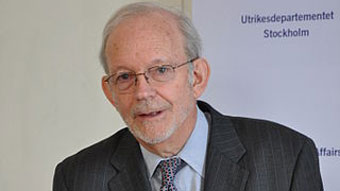
"Colin had been one of the first people I’d talked to when I came to Washington to take on the job. I remember his confirming my view of how to deal with the press. I mean, this is Colin Powell, hero of Desert Storm, even though he kind of opposed it—
"And he’d been national security advisor and all that. I said to him, after we’d chatted about this and the other thing in his office in the Pentagon—this would have been in early January—'So just tell me about what a day is like in your life as the chair of the Joint Chiefs, so I can understand it.' He said, 'Well, it begins every morning with my going out on the porch of my house and looking around for the newspaper and discovering, excuse me, that the Washington Post has been jammed up my ass.' I thought to myself, Whoa, this is going to be tough. If this is happening to Colin Powell, what’s going to happen to mere mortals?"
Read Lake's full oral history.
STEPHEN HADLEY, national security advisor (George W. Bush)
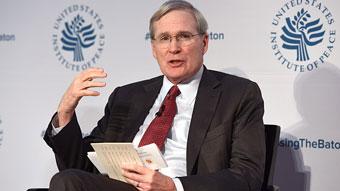
Powell is a very gifted guy. At one meeting at the White House he started giving his political advice. This was in the meeting that President [George H. W.] Bush had with the Joint Chiefs where Schoomaker said I don't think the American people will support the Iraq war much longer and President Bush said, "You let me worry about the politics." Powell started giving some political advice. They come back in the car and Powell, who was a very sensitive guy, realizes that Cheney is not saying anything.
So they get back and he follows Cheney up to the Secretary's office. He. says, "I guess I crossed the line in that meeting, didn't I?" Cheney said, "Yes, Colin, you did. I'll handle the politics; you handle the military planning." That's also a pretty good example of this working out, watching the two of them work out the relationship of Secretary of Defense and Chairman. The way Cheney did it, they didn't compete.
I remember a couple of times, maybe it was Gulf War briefings, they would go together and Cheney would open the meeting and give some comments and then he would turn it over to Powell, and Powell would give military briefing. I remember watching Cheney watch Powell with this kind of smile of amusement and a little bit of pride and satisfaction that his Chairman was doing a great job in the briefing.
So Cheney was a very secure person and he wasn't threatened by subordinates who were doing well. If you kept him informed he would give you a lot of leash. Paul Wolfowitz had a fairly visible role in that period, so did Colin. At one point somebody asked Cheney if he felt threatened by them. He said, "No, they work for me and the better they do, the better I look." That's a great attitude of a leader, the better they do, the better I look. I'm not threatened by them. I'm going to enable and empower them. I think that's a terrific rule of leadership, when you're confident enough to do that. I think they worked that relationship.